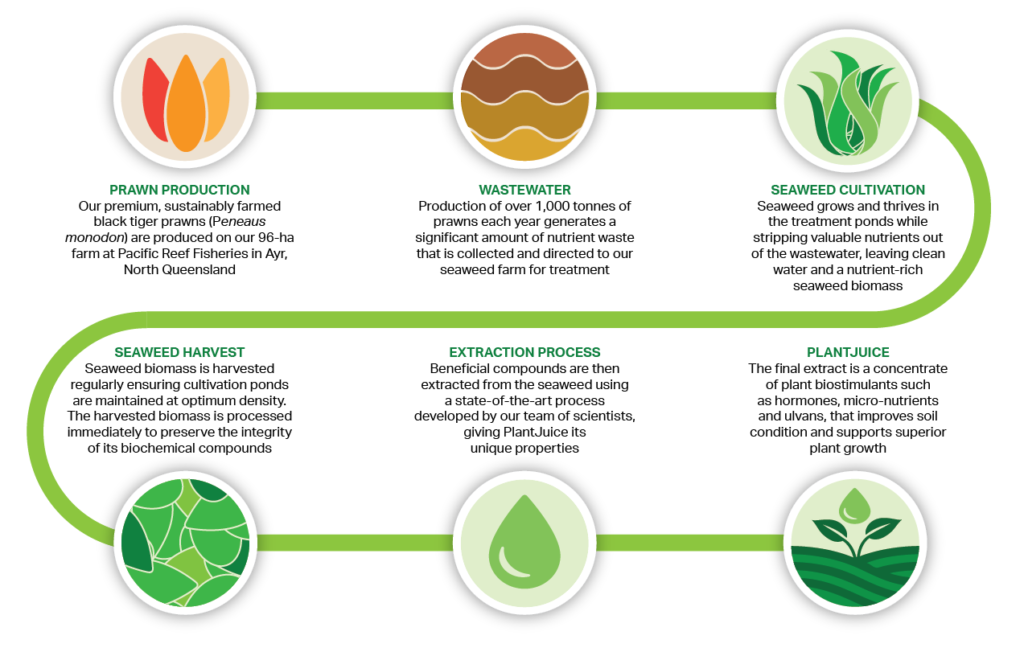The Australian prawn farm raising the bar for sustainable aquaculture
Australian aquaculture and biotech company, Pacific Biotechnologies, has developed a better way to farm prawns. Its Pacific Reef Fisheries operation earned Australia’s first Aquaculture Stewardship Council certification for responsible and sustainable prawn farming. Now, the opportunity exists for a new owner to expand this market-leading business and put locally grown sustainable prawns on more Australian dinner plates.
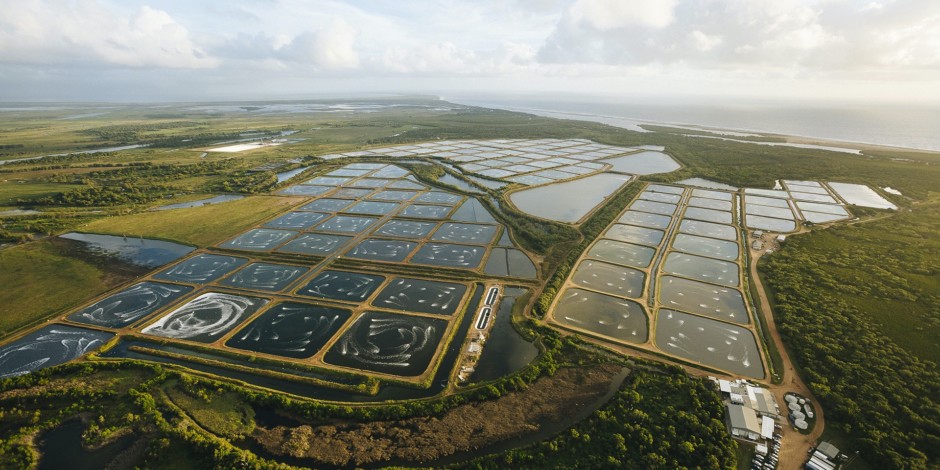 Pacific Reef Fisheries in Ayr, Queensland. Photography by Andrew Rankin
Pacific Reef Fisheries in Ayr, Queensland. Photography by Andrew Rankin
Nestled beside the tropical waters of the Great Barrier Reef, Australian prawn producer, Pacific Reef Fisheries, is acutely aware of the importance of treading lightly on this fragile marine ecosystem. Established in 1998 and rejuvenated in 2017 through acquisition by Australian biotech company, Pacific Biotechnologies, Pacific Reef Fisheries produces more than 1,000 tonnes of premium farmed black tiger prawns each year – accounting for 10% of Australia’s annual domestic prawn production. And it does so by working in harmony with its precious environment.
Pacific Reef’s operations are centred in Ayr, about 90km from Townsville and in the heart of Australia’s sugarcane region. Bastien Finet, Aquaculture Manager for Pacific Reef Fisheries, explained, “Our 96-hectare farm is on the outskirts of mangrove areas – which are natural nurseries for prawns in the wild. It means we can mirror their natural life cycle.”
Black tigers are the biggest native prawns, and relatively niche in the Australian market. Pacific Reef Fisheries grows them out in one-hectare earthen ponds – each producing up to 12 tonnes for the domestic market. “We get a commercial crop from a 30–40-gram animal in about four to six months,” said Bastien.
The rising demand for sustainable Australian seafood
Consumers who are increasingly affluent and focused on sustainability, are triggering growth in demand for aquaculture products, a protein category which the Food and Agribusiness Growth Centre – FIAL – predicts will achieve greater growth in value terms by 2025 than all other protein categories. The transformation is already underway, with farmed prawns forecast to account for over one-third of Australia’s gross value of prawn production in 2021-22.
Pacific Reef Fisheries is set up to capitalise on those opportunities. Bastien explains, “We’ve always had a vested interest in making sure that we’re sustainable,” said Bastien. “But under the leadership of Pacific Bio, our farm now has the solution to deliver the most sustainable prawns and differentiate us from the commodity players.”
That solution is ‘RegenAqua’, the result of a decade-long partnership between Pacific Bio and James Cook University (JCU). “Pacific Reef Fisheries allowed Pacific Bio to trial its water purity solution at scale,” said Bastien. And it passed with flying colours.
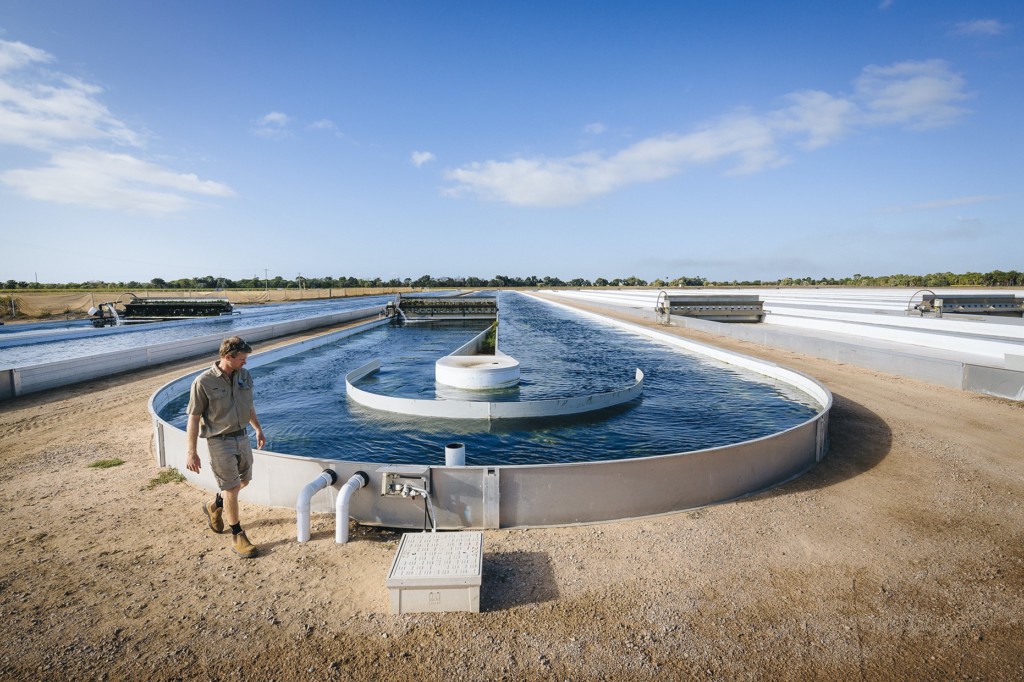
Redefining sustainable prawn production by working with the ecosystem
With over 95% of the nation’s prawn farms located in the warm waters of tropical Queensland, strict regulation applies to managing Australian prawn farm effluent and its impact on this precious, biodiverse marine ecosystem. The legislation permits only very low levels of effluent discharge, at very low concentrations – much lower, in fact than other productive industries or sewage treatment plants in the same area.
Bioremediation refers to the use of either naturally occurring or deliberately introduced microorganisms to consume and break down environmental pollutants, in order to clean a polluted site. Pacific Bio use native macroalgae to strip nutrients from wastewater from polluted marine and freshwater environments, restoring water to ensure it has no net decline on the surrounding environment.
While the sustainability bar is already set quite high, Pacific Bio and JCU raised it, collaborating on an innovative bioremediation solution that not only treats wastewater for reuse but creates a market for the by-products.
Dean Jerry, Professor of Aquaculture at JCU, explained, “They [Pacific Bio] came to us with a clearly articulated problem: how to remove the nitrogen and phosphorus from the wastewater at Pacific Reef Fisheries’ prawn farm, with the objective of having the smallest environmental impact that they could have.”
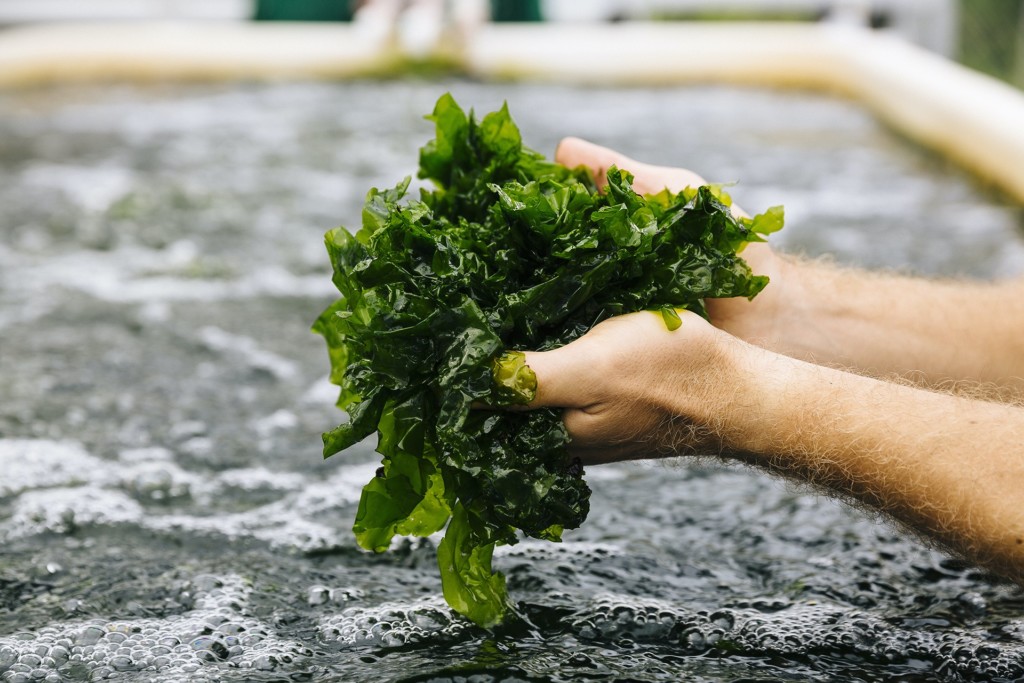
The JCU solution was a macroalgae called Ulva – or ‘sea lettuce’. “Seaweed is a very good mechanism for removing very low levels of nitrogen and phosphorus. And it has an enormous capacity to grow very quickly in the right conditions. Aquaculture production, which is rich in nitrogen and phosphorus, and which in the tropics has high light and warm temperatures, provides just those conditions. Using seaweed to treat the water that comes off aquaculture production is the perfect solution to environmentally manage water quality,” said Dean.
He added, “We worked with Pacific Reef Fisheries to make that not just a laboratory-scale outcome, but a transferable, scalable outcome on farm. That was the critical thing.”
It’s an innovative production model that Bastien believes builds ongoing sustainability into Pacific Reef Fisheries’ operations. “Instead of releasing wastewater, we’re actually able to bring it back into the system.” That means less need to pump water in from the reef, and as a result, significantly less chance of introducing a biosecurity hazard, such as the highly contagious viral white spot disease, which can decimate farmed prawn populations.
Collaboration turns “waste into wealth”
But the seaweed is not just doing the dirty work, so to speak, of cleaning the prawn effluent. “It’s also allowing Pacific Bio to turn waste into wealth, by repurposing that seaweed into downstream products,” said Dean.
Bastien explained, “We’ve got big volumes of macroalgae that we wanted to do something productive with. So we collaborated with JCU to develop a process that allows us to harvest the seaweed and extract beneficial nutrients – or ‘biostimulants’.” The result is PlantJuice, a natural plant biostimulant, soil conditioner and fertiliser that is sold to cane growers and horticulturalists, reducing their need for synthetic fertilisers and minimising chemical runoff. It’s another way that Pacific Bio are giving back to the reef.
Building the prawn farm of the future
The RegenAqua solution is a key driver behind Pacific Bio’s success in securing approval for an expansion at Guthalungra, Queensland. The 800-hectare site is already home to Pacific Reef Fisheries’ prawn hatchery, which produces 100 million prawn post-larvae per year to supply their own and smaller farms in the region.
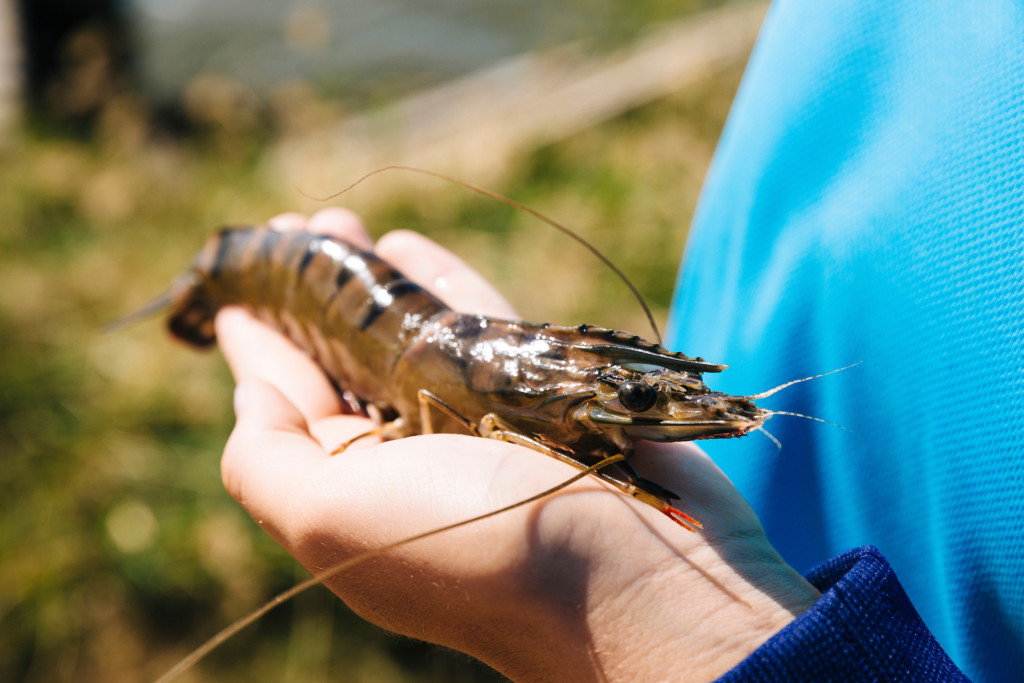
With environmental approvals already in place, Guthalungra could be the prawn farm of the future, with a range of SMART technologies available to automate and improve everything from water quality and energy management to feed systems, pathogen screening and broodstock selection.
Bastien explained, “Australia’s farmed prawn industry is 30 years old, so there’s a lot of old technology. Guthalungra is a great opportunity to drive improvements into the next 30 years.” Smart technology would not just improve the crop and the outputs, but keep the environmental footprint even lower.” So low that Pacific Bio has earmarked just 250 of the 800 hectares at Guthalungra for aquaculture.
Part of the rest has been identified for return to Guthalungra’s traditional owners. Bastien explained, “We’ve always recognised the traditional owners as a key stakeholder in our business; we’re on their ancestral lands. So there’s been a lot of talk with the ILSC [Indigenous Land and Sea Corporation] and other traditional owner groups about the development. We’ve already identified land that we want to give back, and we’ve started conversations around providing employment to Indigenous youth.”
Expansion plan goes beyond Pacific Reef Fisheries – and has government, farmers and investors excited
“The Queensland Coordinator-General has gazetted Guthalungra as a prescribed project [of economic and social significance]. Everyone’s got their eyes set on Pacific Reef Fisheries and how we can make this go ahead. Now, it’s a matter of finding the right owner to support the big picture,” said Bastien.
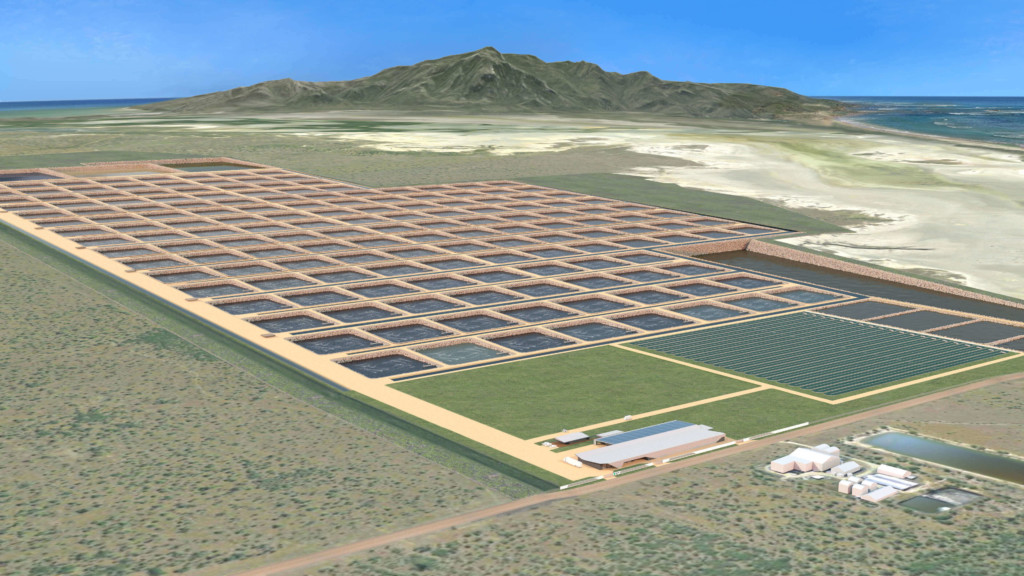
That ‘big picture’ is Pacific Bio’s plan for an aquaculture eco-precinct, which would transform the prawn industry in North Queensland. Bastien said, “Guthalungra is a big project: we’ve got a big block of land and a big sustainability solution. We want to bring different operators together under our EA [environmental authority], using our RegenAqua approach, to boost farmed prawn production. But we also want to build a seafood processing plant – which North Queensland doesn’t have – which could boost value-adding opportunities for Australian aquaculture. We’d be creating jobs, returning more value to farmers, and boosting sustainability. There’s a real story to tell there.”
Having proven their innovative bioremediation technology can translate to aquaculture production, Pacific Bio is ready to tackle innovative water purity solutions for other sectors. With Pacific Reef Fisheries’ Ayr operation and the Guthalungra expansion both on the market now, the opportunity exists for the right owner to champion a thriving farmed prawn industry that taps into the growing demand for sustainably sourced seafood.
To enquire about Pacific Bio investment opportunities, contact Jodie Munro via email: [email protected] or phone: (+61) 3 9086 9926.
Enjoyed this story? Want to learn more about the Asia Pacific region’s innovative agrifood tech ecosystem? Sign up for our newsletter here and receive fresh stories about global leaders, farmers, startups and innovators driving collaborative change.

